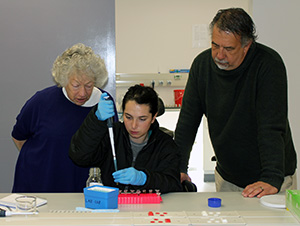Latest News Archive
Please select Category, Year, and then Month to display items
![]()
Prof Marian Tredoux, Associate Professor in the
Department of Geology at the University of the Free State,
recently had a mineral named after her.
Photo: Sonia Small
Prof Marian Tredoux is a geochemist and lecturer in the Department of Geology at the University of the Free State (UFS). Her research interests are rocks, particularly the chemistry of rocks and the minerals they are composed of – chemicals similar to those found in laboratories, although they occur in nature.
Prof Tredoux started her research career at the University of the Witwatersrand (Wits), after which she spent a number of years at the University of Cape Town (UCT). For the past 11 years, she has been at the UFS, which has brought her in close proximity of her primary field-research area in Barberton. This fascinating part of the country has been the focus of her research for 30 years. She has always been intrigued by the earth's crust in this area, which she describes as "very old, very strange, and very interesting".
Prof Tredoux has been collaborating with colleagues and peers overseas in an attempt to unravel the intricacies of this unusual geological area. Some of these colleagues recently discovered a new mineral in one of the rock formations of the Barberton mountain range. They decided to name the mineral after Prof Tredoux, dubbing it tredouxite. "I am very honoured by this, and very grateful that all these years of collaboration are being acknowledged," Prof Tredoux said.
Monkey research attracts international attention
2016-07-11

Prof Trudy Turner from the University of
Wisconsin-Milwaukee and Prof Paul Grobler
from the Department of Genetics at the
University of the Free State, together with one
of the students researching monkey genes.
Photo: Siobhan Canavan
For this year’s Summer School programme, Prof Paul Grobler, from the University of the Free State Department of Genetics focuses on research about the conflict between monkeys and humans in areas where monkeys are regarded as problem animals.
Global expert part of research
This year, Prof Grobler is hosting a group of students and lecturers from the United States of America (USA). The group includes Prof Trudy Turner from the University of Wisconsin-Milwaukee (UWM), a global expert on vervet monkeys. She has been working with the Department of Genetics at the UFS for the past fifteen years, and has also been appointed as an Affiliated Professor in the department.
“The Summer School programme is an opportunity for the American Primatology students to gain practical experience in Africa,” says Prof Grobler.
International interest in Summer School
This year’s Summer School programme involves four lecturers and nine students. The lecturers are from the University of Wisconsin-Milwaukee (UWM), the University of California, Los Angeles (UCLA), Boston University, and Central Washington University.
“We use the genetic information to determine
how monkeys historically infiltrated the
different areas in South Africa.”
This year’s focus is on the genetic structure of the monkeys in South Africa, and research that is being done on the differences and similarities in monkeys from different areas. “We use the genetic information to determine how monkeys historically infiltrated the different areas in South Africa,” says Prof Grobler.
Local nature reserve acting as host
The group will perform field work, including observing monkeys in the Soetdoring Nature Reserve, as well as laboratory work in the department, where they will be assisted by two laboratory technicians.
Two years ago, Prof Grobler and his department tested this idea on a smaller scale, and now they hope to make this a regular event.